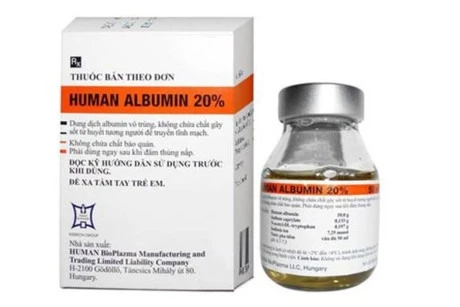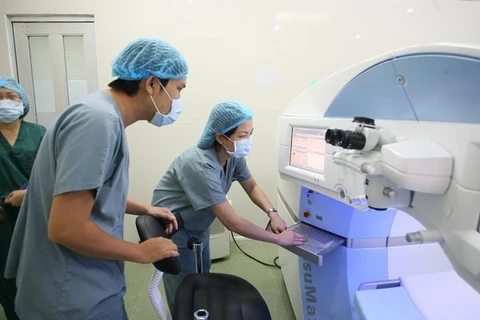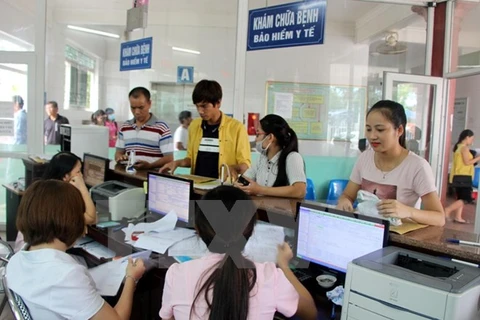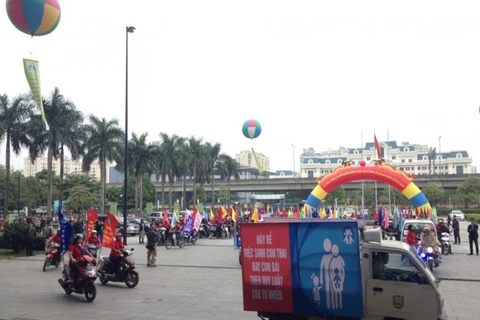Hanoi (VNA) - The Government will spend 2.269 trillion VND (100 million USD) over the next two years on buying five active substances and 22 types of drugs for public hospitals and healthcare centres.
This was the main result of the first ever national centralised bidding for procurement of medicines held on December 11.
Of the 22 drugs, five are specialised drugs and the remaining 17 are generic ones.
Health Ministry officials said the bidding helped save over 477 billion VND (21 million USD) for the State budget. Under the earlier decentralised procurement process, the ministry estimates the pharmaceutical products would have cost about 2.746 trillion VND (121 million USD).
Deputy Health Minister Pham Le Tuan said that when the bids were organised separately by localities, hospitals or healthcare centres, the costs of a drug differed greatly, and were also likely to be more expensive.
The centralised bidding process would have the added advantage of making it easier to manage the supply, cost and quality of drugs, Tuan said.
Deputy Director General of Vietnam Social Security Pham Luong Son, said that the centralised bidding was expected to be an effective way to ensure supply of proper medicines to patients at reasonable costs as well as increase efficiency of using health insurance funds for medical check-ups and treatment.
The Health Ministry had announced in March 2017 the establishment of the National Centralised Drug Procurement Centre (NCDPC) to handle shortcomings in the then prevalent bidding process and drug price management in the country.
The centre, functioning under the Health Ministry, will assume responsibility of organising bids for procuring pharmaceutical products compiled after collecting requirements from public hospitals and healthcare facilities nationwide.
The centre will also negotiate prices for drugs on the list in accordance with the law.
Bids for drugs outside the list of centralised bidding will be conducted at all three levels – central, provincial and lower-level State-run facilities –under the management of the new centre.
Officials say this will contribute to effective utilisation of health insurance funds for medical check-ups and treatment, enhance fund balancing capability and ensure the rights of patients with health insurance.
According to Vietnam Social Security, in 2015, the expenditure on medicines was 26 trillion VND, accounting for 48.3 percent of the health insurance fund.
Deputy Director of the Hanoi Health Department, Tran Van Trung, said that they had organised a local centralised drug bidding procurement for the first time.
He said difficulties remained relating to the four different lists of drugs, given that the process was different, with some being handled by the Health Ministry and Vietnam Social Security, and others by localities or healthcare centres with their own lists.
Trung said that for each list, bidding organisers would sign contracts with winning bidders and the contract terms were different, causing difficulties for hospitals in receiving and paying for the medicines.-VNA
This was the main result of the first ever national centralised bidding for procurement of medicines held on December 11.
Of the 22 drugs, five are specialised drugs and the remaining 17 are generic ones.
Health Ministry officials said the bidding helped save over 477 billion VND (21 million USD) for the State budget. Under the earlier decentralised procurement process, the ministry estimates the pharmaceutical products would have cost about 2.746 trillion VND (121 million USD).
Deputy Health Minister Pham Le Tuan said that when the bids were organised separately by localities, hospitals or healthcare centres, the costs of a drug differed greatly, and were also likely to be more expensive.
The centralised bidding process would have the added advantage of making it easier to manage the supply, cost and quality of drugs, Tuan said.
Deputy Director General of Vietnam Social Security Pham Luong Son, said that the centralised bidding was expected to be an effective way to ensure supply of proper medicines to patients at reasonable costs as well as increase efficiency of using health insurance funds for medical check-ups and treatment.
The Health Ministry had announced in March 2017 the establishment of the National Centralised Drug Procurement Centre (NCDPC) to handle shortcomings in the then prevalent bidding process and drug price management in the country.
The centre, functioning under the Health Ministry, will assume responsibility of organising bids for procuring pharmaceutical products compiled after collecting requirements from public hospitals and healthcare facilities nationwide.
The centre will also negotiate prices for drugs on the list in accordance with the law.
Bids for drugs outside the list of centralised bidding will be conducted at all three levels – central, provincial and lower-level State-run facilities –under the management of the new centre.
Officials say this will contribute to effective utilisation of health insurance funds for medical check-ups and treatment, enhance fund balancing capability and ensure the rights of patients with health insurance.
According to Vietnam Social Security, in 2015, the expenditure on medicines was 26 trillion VND, accounting for 48.3 percent of the health insurance fund.
Deputy Director of the Hanoi Health Department, Tran Van Trung, said that they had organised a local centralised drug bidding procurement for the first time.
He said difficulties remained relating to the four different lists of drugs, given that the process was different, with some being handled by the Health Ministry and Vietnam Social Security, and others by localities or healthcare centres with their own lists.
Trung said that for each list, bidding organisers would sign contracts with winning bidders and the contract terms were different, causing difficulties for hospitals in receiving and paying for the medicines.-VNA
VNA
























